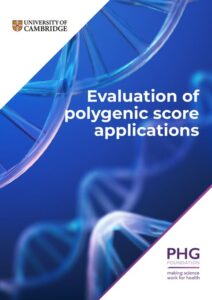Home Publications Reports Evaluation of polygenic risk score applications
Evaluation of polygenic score applications
Considerable progress has been made in uncovering common single nucleotide variants and developing mechanisms for genomic profiling. Using this knowledge routinely as part of clinical and public health practice is an ongoing aspiration.
While products that enable conversion of genomic data into genome-based risk scores such as polygenic scores (PGS) are available, they are not widely used. Key barriers are uncertainty and a lack of evidence regarding the value of polygenic score information and how to approach evidence gathering and appraisal.
In Evaluation of polygenic score applications we discuss our analysis of the application of the principles of medical test evaluation to PGS based products.
Medical test evaluation frameworks such as the ACCE framework can be used in evidence assessment and contribute to more informed and transparent decision making. Central to this process is consideration of context of use and application of an iterative process to examine evidence across domains of scientific, analytical, and clinical validity and utility.
Evaluation of any polygenic score application will require evidence for and consideration of these different domains. We demonstrate how specific factors drive uncertainties about products that provide or incorporate a polygenic score. These include:
- conflation of terminology relating to polygenic scores, models and algorithms
- inadequate description of specific applications, in relation to intended population,
role and purpose as part of specific healthcare pathways - failure to define and evaluate all the key elements of PGS applications
- lack of real-world evidence (RWE) for PGS applications
Failure to adequately address these factors lead to a challenge for decision makers because, the existing evidence base
- fails to show what information polygenic scores are providing
- does not define with adequate precision how the product is to be used
in health care or its intended purpose or objective or - how such use can be beneficial to the individual patient or to the health system as a whole
The consequence is that the current body of evidence is inadequate for the determination of the clinical validity or utility of a polygenic score product in relation to its intended purpose. In Evaluation of polygenic score applications we show that it is possible to resolve these issues and address the needs of decision-makers through a more systematic approach to evidence generation.
Chapters 2-4 provide background information for readers not directly working with polygenic scores. This is to enable a shared understanding of relevant topics. In the latter half of the report (Chapters 5-7) we present the results of our analysis.
The above is an abridged version of the executive summary

